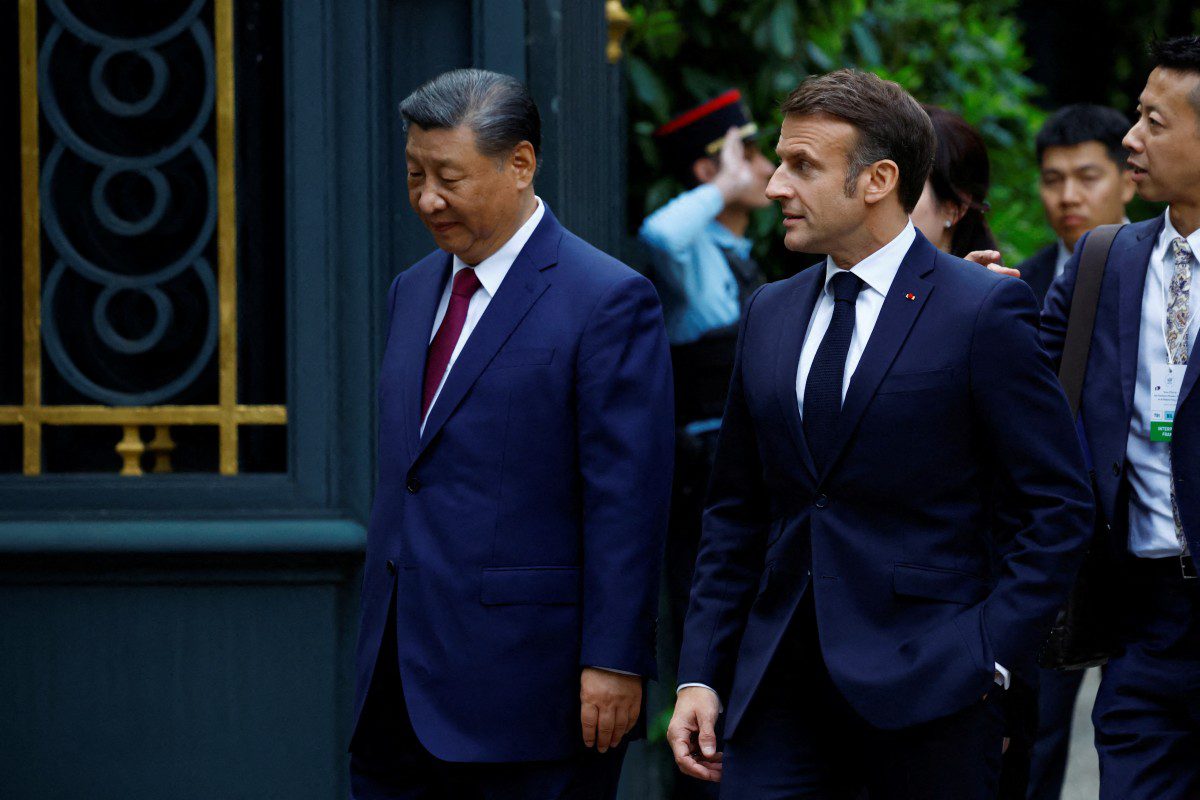
French president Emmanuel Macron and Chinese president Xi Jinping walk in the garden as they leave after a joint statement at the Elysee Palace, as part of the Chinese president’s two-day state visit in France, in Paris on May 6, 2024.
Photo by Sarah Meyssonnier / POOL / AFP
Almost one year after French president Emmanuel Macron’s visit to China, his counterpart, Chinese president Xi Jinping made his own sojourn to the French capital—his first to a European Union country in half a decade.
Unlike their previous high-level meeting, Xi and Macron did not meet alone on Monday, as they were joined by European Commission chief Ursula von der Leyen, who was there to represent the interests of the bloc.
Can China be trusted on questions of trade and foreign policy? And does Monday’s meeting change this position?
At the moment, the main concerns are economic, as the EU is coming to grips with Chinese imports. Given that these are from companies heavily subsidized by the state they are proving detrimental to their European rivals. Ahead of the meeting, the EU had launched a series of investigations into Chinese products, as if to prove this point.
Imposing tariffs on Chinese electric vehicles is a protectionist measure that would come as a severe blow to Beijing, which has invested many billions into the sector, providing employment to millions in a country already facing a 5.3% unemployment rate.
The EU has considerable leverage on China, since the bloc accounts for around 40% of China’s (electric vehicle) EV exports. This number may very well increase should the EU continue on the path of phasing out combustion engines by 2035.
Von der Leyen presented herself as the defender of the EU’s own EV industry, as she railed against China “flooding” her bloc’s market with its “surplus production” of EVs. “Europe will not waver from making tough decisions needed to protect its market,” she added.
However, it is possible that the EU will not further pursue its investigations into the EV issue. After the trilateral meeting with Xi, the EU chief said the bloc would “closely coordinate with G7 countries and emerging economies” to tackle “China’s market distortions,” which could indicate that the EU is nervous about going it alone and wants its allies to help shoulder the responsibility and potential cost.
Indeed, regarding China policy, the EU’s 27 members are not of one mind. While Paris seeks a tougher line on EV imports, Berlin, its main competitor for influence within the bloc, is treading more carefully.
Xi, for his part, rejected such claims of “China’s overcapacity” from the perspective of comparative advantage and in light of global demand. He said, in his typically standoffish manner, that any such disputes should be resolved through dialogue— although he did not go into detail.
In response to potential EU tariffs on Chinese products, China voiced its intent to target French cognac exports. Seeking to avoid that outcome, Macron publicly called on Xi not to do so.
To help smooth things over, Macron gave Xi gifts of cognac by Hennessey and Remy Cointreau, two brands—among many—which are in Beijing’s crosshairs.
Macron also invited the world’s richest man Bernard Arnault—boss of luxury firm LVMH, which owns Hennessey—to the state dinner with Macron and Xi.
Meanwhile, on the sidelines, various deals between French and Chinese companies—ranging from energy, finance, and transport—were inked.
As the Russia-Ukraine and Israel-Hamas wars continue unabated, both Macron and von der Leyen see at least one win coming out of the meeting. Xi appeared to join them in calling for an “Olympic truce” during the Summer Games in Paris.
“The world today is far from being calm. As a member of the United Nations Security Council and as a responsible country, China urges together with France for a truce in the world during the Paris Olympic games,” Xi said during a joint statement.
That however brings up the thorny issue of China exporting arms to Russia while it prosecutes its war with Western-backed Ukraine.
According to Macron’s thinking, his Chinese counterpart had promised to no longer export any weapons and to “control strictly the exports of dual-use goods” to Russia. Nevertheless in light of the two nations’ “no limits” friendship and continued, even increased, flow of arms, reservations about Xi’s sincerity should be maintained.
Indeed, Xi made a similar promise just over a year ago, as the French leader pointed out during his press statement. “It’s what you had told me very clearly, Mr. President, a bit more than a year ago, and which you have now repeated,” he said.
Before his meeting with Macron, Xi had urged his counterpart to join him in showing “independence” and “prevent a ‘new Cold War’” between blocs, in what could be perceived as a veiled reference to the influence Washington exerts on—and within— European nations, the EU, and the NATO military alliance.
“We need to be forward-looking and work together for an equal and orderly multi-polar world,” Xi said, in what again is a formulation of an alternative to the vision of a U.S.-led world order.
Before heading off to state visits in Serbia and Hungary, Xi was taken on an excursion to the mountainous Pyrenees on Tuesday—the birthplace of Macron’s maternal grandmother—a perhaps vain attempt at softening the heart of this most calculating of world leaders, who knows time is on his and his country’s side.
